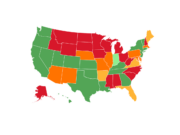Washington, DC – Institute for Free Speech Attorney Ryan Morrison will testify before the IRS tomorrow morning concerning a proposed rulemaking to protect the personal information of nonprofit donors. Under the rulemaking, most kinds of nonprofits would no longer be required to report the names and addresses of their major donors on annual tax forms.
“The proposed rule will help protect free speech. The IRS should not warehouse sensitive personal information it doesn’t need,” said IFS Attorney Ryan Morrison.
The Institute for Free Speech has long fought for privacy reform at the IRS. The Institute filed two sets of comments in support of the rulemaking.
“When the government compels disclosure of a private organization’s financial supporters, it intrudes on the First Amendment’s protection of free association,” the comments explain. “Since NAACP v. Alabama, the Supreme Court has held that unjustified ‘state scrutiny’ of a private organization’s membership is inconsistent with all Americans’ right ‘to pursue their lawful private interests privately and to associate freely with others in so doing.’ Indeed, the Supreme Court has ‘repeatedly found that compelled disclosure, in itself, can seriously infringe on privacy of association and belief guaranteed by the First Amendment.’”
Although nonprofit donor records are confidential by law, the government has failed to protect private records from leaks and inadvertent disclosures. New technology has made this information more vulnerable to mass exposure than ever before.
“In the past, all government records were on paper and stored in physical filing cabinets. Accordingly, a significant theft of confidential information was difficult to accomplish. Today, so-called ‘thumb drives’ can store over 75 million pages of information… Additionally, the IRS now provides Form 990 information for every organization that files a Form 990 in a bulk download. If the IRS were to err, as it has done in the past, and include confidential information in that bulk download, the information can never be retrieved from the public domain,” the Institute’s supplemental comments explain.
The IRS has acknowledged it does not use donor information to enforce tax laws. Under the rulemaking, the IRS could still access donor records when needed through its normal investigatory process. The new rule would also still require Section 501(c)(3) and 527 organizations to report donor names and addresses.
The hearing will take place on Friday, February 7 at 10 AM in the IRS Auditorium.
To read the Institute’s comments, click here and here, or go to: https://www.ifs.org/wp-content/uploads/2019/11/2019-11-04_IFS-Comments_IRS_REG-102508-16_Exempt-Org-Reporting-Requirements.pdf and https://www.ifs.org/wp-content/uploads/2019/12/2019-12-09_IFS-Supplemental-Comments_IRS_REG-102508-16_Exempt-Org-Reporting-Requirements.pdf.
About the Institute for Free Speech
The Institute for Free Speech is a nonpartisan, nonprofit 501(c)(3) organization that promotes and defends the First Amendment rights to freely speak, assemble, publish, and petition the government. Originally known as the Center for Competitive Politics, it was founded in 2005 by Bradley A. Smith, a former Chairman of the Federal Election Commission. The Institute is the nation’s largest organization dedicated solely to protecting First Amendment political rights.













